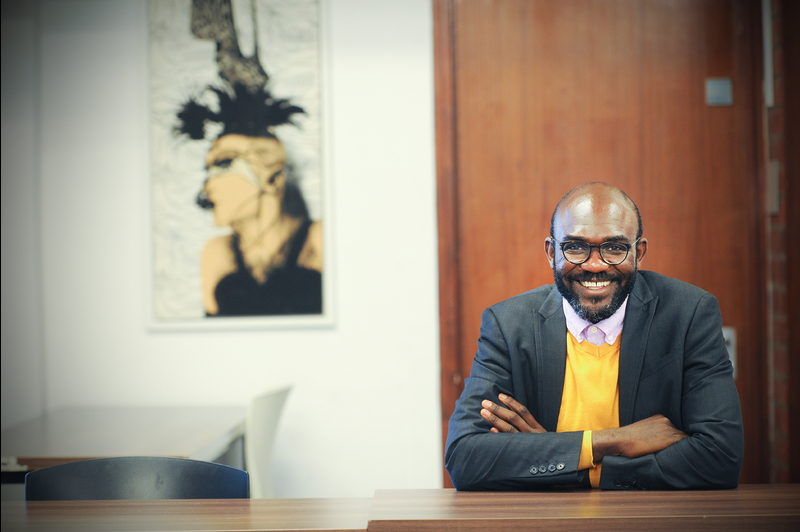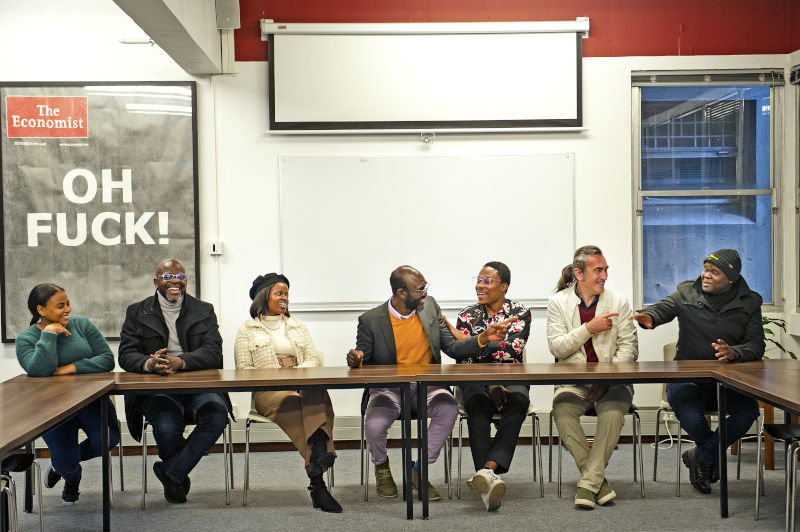Disobedient knowledge and respect for our African humanity
05 September 2022 | Story Natalie Simon Photo Lerato Maduna Read time 10 min.
Around 70% of the population of sub-Saharan Africa is under the age of 30, making it – according to the United Nations – the youngest population in the world. With a statistic like this, a stark comparison to the ageing populations of the Global North, there can be no doubt that the future is African. But what will this future look like? This is the question asked by the Institute for Humanities in Africa (HUMA), a hub of innovative research at UCT under the guidance of its director, Dr Divine Fuh.
“What we are doing at HUMA,” says Fuh, “is asking ourselves, ‘What do we need to do now to build the continent’s scientific machine for the future?’”
Fuh’s vision for HUMA is to be a base from which to create interdisciplinary and pan-African research communities that are working to identify and address Africa’s future challenges.
Key to this work is the decoloniality project. Throughout HUMA’s research agenda there is a strong focus on turning African ideas and philosophies into methodological tools and ways of thinking, a practice he refers to as ‘epistemic disobedience’ (or disobedient ways of knowing).
He stresses that while Eurocentric methodologies may be effective elsewhere, they cannot be applied wholesale to different contexts, like that of Africa. One of the key objectives of HUMA is to identify key challenges of the future and analyse those through an African lens with a context-relevant methodology, thus adding to global knowledge production.
Building a pan-African scientific system
Despite Africa’s population size, the continent contributes less than 1% to global scientific knowledge. At the same time, there is a critique that global knowledge production has not yet done much to improve lives in Africa.
“What do we need to do now to build [Africa’s] scientific machine for the future?”
HUMA intends to contribute to changing this reality by building cohorts – what Fuh refers to as epistemic communities or knowledge communities – who have both the expertise and ideological grounding to redefine the continent in the next 20 years. These individuals will have an important role to play wherever they end up, be it in policy, funding agencies, government, teaching or research.
Intellectual mobility across the borders of Africa is important to the building of these cohorts.
“We want a network of African scientists who know one another, who work together and support one another,” says Fuh.
But HUMA is working globally too.
“If your aim is to redefine not just knowledge but how knowledge is produced, you need to work with a wide range of people,” says Fuh. “So, we are working with people from Asia, Europe and the Americas too, but the focus of our work is building a strong networked pan-African scientific community.”
The decolonial project
“Decoloniality is an important part of the HUMA mandate,” explains Fuh. The violence of colonization left what he refers to as a virus in the African knowledge ecosystem. A virus that led to a toxic state of co-dependence which needs to be undone.
“The first step,” says Fuh, “is understanding that Eurocentric knowledge is only one lens through which to view and analyse the world.”
What this means in practice is taking African ideas and turning them into analytical concepts.
“We are asking, what methods and tools can we use that take African lives, experiences, thinking and dignity and put them at the forefront?” explains Fuh. “We are therefore working a lot with data: how to gather data, how to analyse and interpret data within an African or decolonial framework.”
This is epistemic disobedience, and Fuh stresses that it is a constructive and not a destructive process. “We are the system,” he says, “if we break the system, we break ourselves.”
Setting the research agenda
“Funding makes or destroys science,” says Fuh. “A core part of scientific work on this continent is responding to calls put out by funders.”
This effectively means that, because most funders are based in the Global North, the research agenda is set in the Global North. Funders then send out calls for proposals, and researchers scramble to put together a proposal that aligns with the funder’s agenda, rather than the needs of the communities in which the researchers are embedded.
HUMA is working with funders to upend this and instead encourage funders to work with the HUMA researchers based in Africa to fund work both see as critical to the future of the continent.
“I think this is the only way that the continent can really begin to take control of and invest in its own narrative,” says Fuh.

Future Hospitals Project
The philosophies of epistemic disobedience and pan-Africanism underpin the research undertaken by HUMA, which has a key theme in being human.
What does it mean to be human in the world? What does it mean to be African in the world? And what does it mean to be human in Africa?
The Future Hospitals Project – one of HUMA’s flagship research projects because of the importance of healthcare and health to human development – starts with a simple question: what will hospitals look like in 50 years, particularly in the context of artificial intelligence (AI)?
AI is playing a growing role in healthcare for diagnostics and treatment. But this can be a double-edged sword. While AI can solve some of the problems experienced by under-resourced healthcare centres in Africa, it could introduce problems of its own.
Looking to this AI future of healthcare, HUMA is asking, what kinds of ethics are guiding these AI? What are the ethical values behind the algorithms?
“I think this is the only way that the continent can really begin to take control of and invest in its own narrative.”
Fuh notes two issues with AI for Africa. The first is the sub-culture out of which it was born, one of masculinity that in AI has manifested in issues of sexism, racism and ableism. The second is that it was developed with a sense of personhood different to what we live and experience in Africa.
“AI and algorithms are born out of a particular assumption of subjectivity and personhood, that of the very predictable Cartesian subject,” says Fuh. “But in other cultures, we see other subjects. In Africa, our subjects are born out of concepts like ubuntu, or teranga, as it is called in Senegal.”
These, he explains, are less predictable because they are a networked subject with a responsibility to the collective.
“So, how do we collect data in this context? And whose data will the AI in Africa be trained on?” asks Fuh. “These are the kinds of questions HUMA needs to be grappling with.”
Much like the Eurocentric knowledge production machine, AI is here to stay, for better or worse. And we need to figure out how to work with it.
“How do we cohabit this world of algorithms and AI to make sure we [as Africans] cohabit it with our own humanity and our own understanding of humanity?”
 This work is licensed under a Creative Commons Attribution-NoDerivatives 4.0 International License.
This work is licensed under a Creative Commons Attribution-NoDerivatives 4.0 International License.
Please view the republishing articles page for more information.









